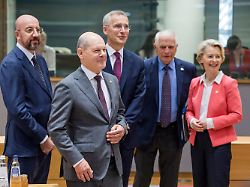Ukraine after the war
The EU does not commit itself to security guarantees
6/29/2023, 9:59 p.m
Because of individual member states such as Austria and Ireland, the 27 EU states cannot agree on a long-term security guarantee for Ukraine. At a summit in Brussels, only a vague declaration of intent is made. Two other points are more specific.
The European Union promises Ukraine further comprehensive support, but is reluctant to provide security guarantees for the period after the end of the Russian war of aggression. At the EU summit in Brussels, the 27 member states could only agree on a vague declaration of intent for “future security commitments”. The EU states are concerned about the possible transfer of Russian mercenaries from the Wagner group to Belarus. Eastern countries like Poland, Lithuania and Latvia fear for the security of the EU’s external border.
Support for Ukraine is one of the top themes of the two-day summit. Also on the agenda were the EU’s future migration policy and the economic situation in the community, as well as relations with China. At the beginning, many summit participants commented above all on the unclear situation in Russia after the confrontation between Wagner boss Yevgeny Prigozhin and President Vladimir Putin.
On Saturday, Prigozhin abruptly called off a march on Moscow and declared his willingness to move to Belarus, a neighboring EU country, with an unknown number of mercenaries. The EU heads of state and government discussed at the beginning of their summit with NATO Secretary General Jens Stoltenberg. An EU diplomat then said it was clear that the stationing of Russian nuclear weapons in Belarus, combined with the deployment of mercenaries, could become an “explosive cocktail”. The situation is unstable. But the EU must remain calm and continue to support Ukraine.
Chancellor Olaf Scholz made it clear: “Our goal here is not a change of government, a regime change in Russia. Our goal, which we are pursuing, is an independent Ukraine.” When asked, he recalled NATO’s promise of assistance to all member states: “Every attack on NATO territory is a matter that we will answer together.” When asked about possible security guarantees for Ukraine after the end of the war, Scholz said: “As states, we have committed ourselves to continuing to owe Ukraine something in terms of its security.”
“Neutral states” stand in the way
The summit declaration on the issue of security commitments was then very vague. The reason for the cautious choice of words was the attitude of countries such as Austria, Ireland and Malta. They want to remain militarily neutral and are therefore not a member of NATO. The Austrian Federal Chancellor Karl Nehammer said on the subject of security guarantees: “It is clear to us as neutral states that they cannot exist in this way.”
The summit declaration became more specific on two other points: The EU states want to give Ukraine more support in planning an international peace summit, which the Ukrainian President Volodymyr Zelenskyj could organize in Switzerland. The other point: the EU is offering further assistance to Ukraine after the destruction of the Kakhovka dam, on top of the civil protection assistance already provided.
Poland announced on Wednesday evening that it would like to further secure its eastern border because of the planned transfer of Wagner mercenaries to Belarus. Both an increase in the uniformed forces and stronger fortifications in the event of an attack are planned, said Deputy Prime Minister Jaroslaw Kaczynski.
At the summit, Latvian Prime Minister Krisjanis Karins said the fact that an unknown number of trained fighters were stationed in Belarus could pose a threat. “The threat would likely not be a frontal military one, but an attempt to infiltrate Europe for unknown purposes. That means we need to pay special attention to the borders and make sure we can control that.” Lithuania has already announced stronger controls on its borders with Russia and Belarus.
